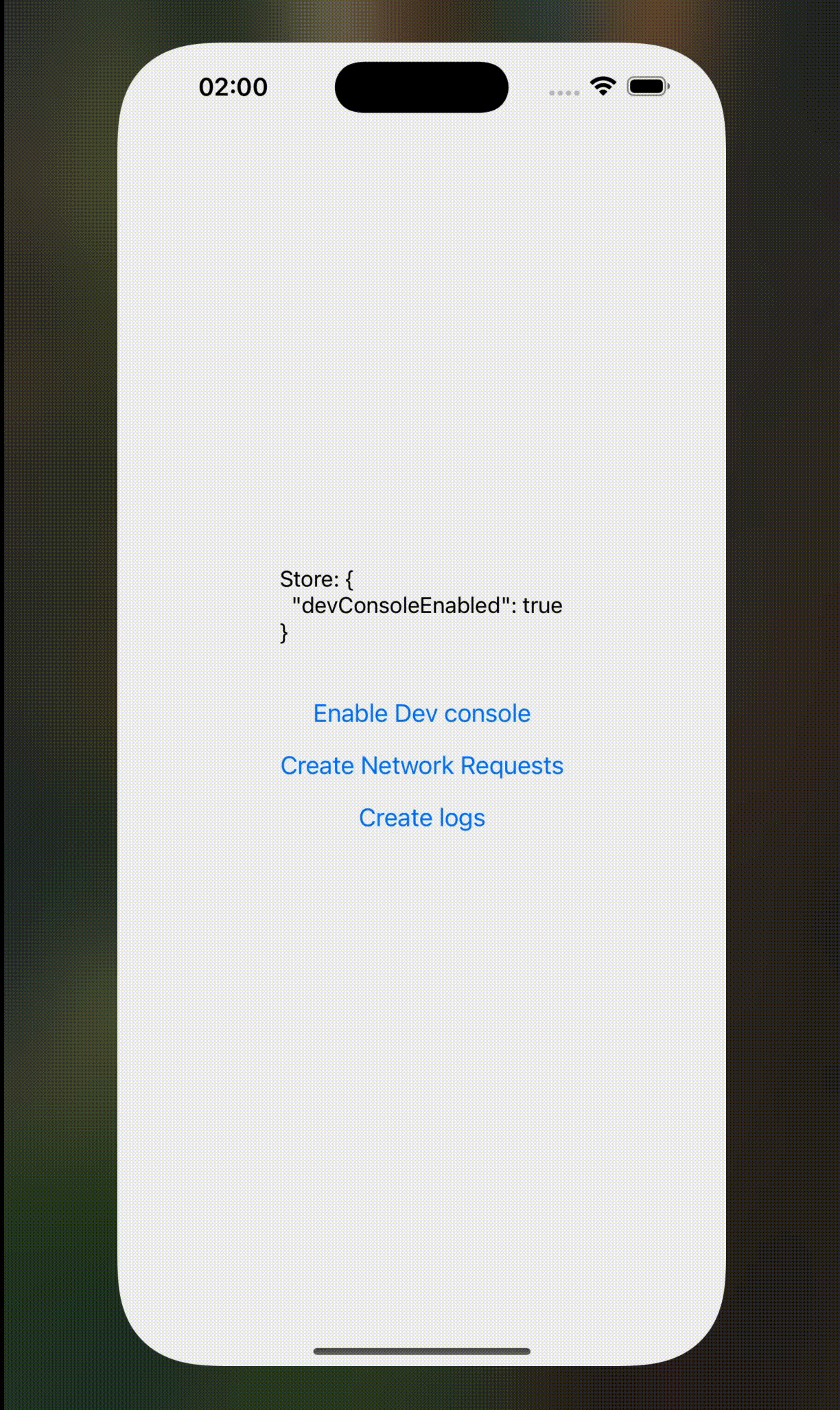1.0.7 • Published 7 months ago
@corrbo/react-native-dev-console v1.0.7
React Native Dev Console
A simple in-app developer console for React Native applications that allows viewing logs, network requests, and developer tools in production environments.
Example

Features
- Log Viewer - View log, warn, error, and info logs with optional tags for filtering.
- Network Inspector - Monitor HTTP traffic (powered by react-native-network-logger).
- Custom Tab - Extend functionality with custom developer toggles and environment configuration.
- Floating Button - Activate the console programmatically or through specific runtime conditions.
- Production-ready - Designed to work in release builds and safe for production use.
Installation
1. Install the library
npm install react-native-dev-console2. Install peer dependencies (if not already installed)
npm install react-native-reanimated react-native-gesture-handler react-native-safe-area-context For iOS:
npx pod-install Quick Start
1. Wrap your application
<GestureHandlerRootView>
<SafeAreaProvider>
<Console>
<App/>
</Console>
</SafeAreaProvider>
</GestureHandlerRootView>File Structure
Recommended structure for custom Dev Console logic:
src/configs/DevConsole
├── CustomTab.tsx # Custom tab with toggles and versioning (optional)
├── init.ts # Initialization logic for Dev Console
└── types.ts # Dev Console store typesinit.ts
import {version} from '../../../package.json'
import {LocalStorageService, LSKeys} from 'services/LocalStorage'
const isDevelop = process.env.NODE_ENV === 'development'
const store = LocalStorageService.getString(LSKeys.LSDevConsoleStore) || `{"devConsoleEnabled": ${isDevelop}}`
const parsedStore = JSON.parse(store)
export const ConsoleService = {
store: {
...parsedStore,
isDevUrl: parsedStore?.isDevUrl ?? isDevelop,
version: parsedStore?.version ?? version,
},
onSetStore: (newStore: any) => {
console.log({newStore})
LocalStorageService.set(LSKeys.LSDevConsoleStore, JSON.stringify(newStore))
},
}types.ts
export interface IDevSettingsStore {
isDevUrl: boolean
version: string
} CustomTab Component
import {ICustomTabProps} from 'react-native-dev-console'
import {Button, StyleSheet, Switch, Text, TextInput, View} from 'react-native'
import React, {useState} from 'react'
export const CustomTab: ICustomTabProps = ({store, setKey}) => {
const [version, setVersion] = useState(store.version)
return (
<View style={styles.container}>
<View style={styles.item}>
<Text style={{color: '#fff'}}>Dev Url Api</Text>
<Switch
value={store.isDevUrl}
onChange={() => setKey('isDevUrl', !store.isDevUrl, true)}
/>
</View>
<View style={styles.item}>
<TextInput
style={{color: '#fff', flex: 1}}
placeholder={'Version'}
value={version}
placeholderTextColor={'#b4b4b4'}
onChangeText={text => setVersion(text)}
keyboardType={'numeric'}
/>
<Button
title={'Submit'}
onPress={() => setKey('version', version, false)}
/>
</View>
</View>
)
}
const styles = StyleSheet.create({
container: {
width: '100%',
paddingHorizontal: 16,
paddingBottom: 24,
},
item: {
flexDirection: 'row',
alignItems: 'center',
justifyContent: 'space-between',
borderBottomWidth: 1,
borderBottomColor: '#727272',
paddingBottom: 5,
},
})The CustomTab component receives the following props:
export interface ICustomTabProps {
store: Record<string, any>
setKey: (key: string, value: any, reload?: boolean) => void
} | Prop | Type | Description |
|---|---|---|
| store | Record<string, any> | Current state of the Dev Console store |
| setKey | (key: string, value: any, reload?: boolean) => void | Updates the store. When persist is true, reload App |
Console Component Props
| Prop | Type | Description | Required |
|---|---|---|---|
| children | React.ReactNode | Your app root wrapped with the Dev Console | Yes |
| CustomTab | ICustomTabProps | Optional tab with custom settings and toggles | No |
| button | { style?: StyleProp, content?: React.ReactNode } | Customizes the floating button | No |
| button.style | StyleProp | Style override for the floating button | No |
| button.content | React.ReactNode | Custom content (icon/text) for the floating button | No |
Dev Console Methods
The Console object exposes global functions for programmatic access:
ts Console.enable() Console.log(message: string, tag?: string) Console.error(message: string, tag?: string) Console.info(message: string, tag?: string) Console.warn(message: string, tag?: string)
All logs appear in the Logs tab of the Dev Console.
| Method | Description |
|---|---|
| Console.enable() | Opens the Dev Console manually |
| Console.log() | Adds a standard log message with optional tag for filtering |
| Console.error() | Adds an error message (highlighted in red) |
| Console.info() | Adds an informational message (highlighted in blue) |
| Console.warn() | Adds a warning message (highlighted in yellow) |
Example Usage
Console.enable()
Console.log('User logged in', 'Auth')
Console.error('Failed to fetch user data', 'API') Example: Dynamic API URL Switching
Use the isDevUrl flag to switch between development and production API endpoints at runtime:
src/configs/DevConsole/init.ts
import {version} from '../../../package.json';
import {LocalStorageService, LSKeys} from 'services/LocalStorage';
const isDevelop = process.env.NODE_ENV === 'development';
const stored = LocalStorageService.getString(LSKeys.LSDevConsoleStore);
const parsed = stored ? JSON.parse(stored) : {};
export const ConsoleService = {
store: {
isDevUrl: parsed.isDevUrl ?? isDevelop,
version: parsed.version ?? version,
},
onSetStore: (newStore: any) => {
LocalStorageService.set(LSKeys.LSDevConsoleStore, JSON.stringify(newStore));
},
};services/Api.ts
import axios from 'axios';
import {ConsoleService} from 'src/configs/DevConsole/init';
const DEV_BASE_URL = 'https://dev.api.myapp.com/';
const PROD_BASE_URL = 'https://api.myapp.com/';
export const api = axios.create({
baseURL: ConsoleService.store.isDevUrl ? DEV_BASE_URL : PROD_BASE_URL,
});
// Update the baseURL dynamically when the flag changes
ConsoleService.onSetStore = (store) => {
api.defaults.baseURL = store.isDevUrl ? DEV_BASE_URL : PROD_BASE_URL;
};License
MIT License - free for personal and commercial use.